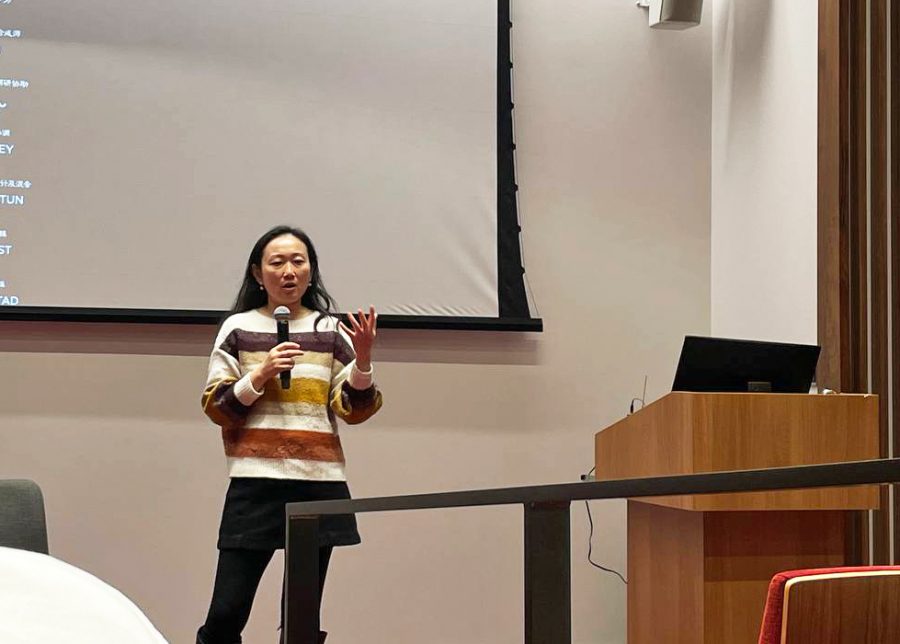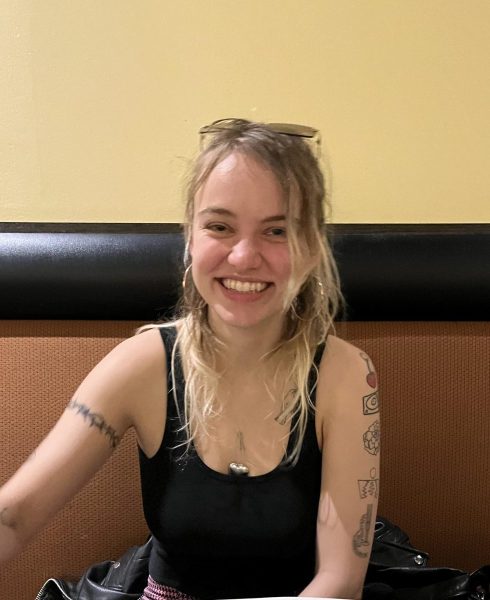Oscar-nominated filmmaker Violet Du Feng visits Grinnell
Feng answered questions and discussed the film with attendees following the screening.
March 12, 2023
Filmmaker Violet Du Feng visited Grinnell to showcase her documentary “Hidden Letters” which focuses on contemporary use of Nüshu, a historical Chinese language that allowed women to secretly communicate amongst each other under patriarchal forces of suppression. Through the combined student-organization efforts of the Chinese, Japanese and East Asian studies (CJEAS) Student Educational Policy Committee (SEPC) and the Film Club, Feng participated in a Q&A session last Monday after screening her film, which was recently shortlisted for an Oscar award, ahead of any theatrical or global release.
“I think what’s so remarkable is that they found their own way to negotiate with the power,” Feng said in reference to the women who used Nüshu. “They found their own way to negotiate with the existing system and structure by creating their own space, creating the safe space, to allow them to be honest, to be authentic with themselves in their circumstances, meaning that they can be vulnerable and share their sufferings with each other.”
“Hidden Letters” explores the lives of two women, Hu Xin, from the rural village of Jiangyong, and Simu, who lives in urban Shanghai. Though young adults, both practice the historical tradition of Nüshu that was utilized in ages before them by women whose worth was tied to the men around them. As the director, Feng takes a feminist approach in including the modern pressures placed on Hu Xin and Simu as women in a male-dominated world — a world that, though seemingly progressive in comparison to the period when the writing practice originated, continues to oppress them.
“To me, the key value of Nüshu is that it allowed this honesty for these women,” said Feng. “Honesty is really the fundamental foundation of me being a filmmaker and also thinking that it’s not just the final product — it’s really every step of the process.”
Feng has been involved in other documentaries not as a director, but as a producer. She said her current professional aspiration is specifically producing women’s work so China may have more female representation in the film industry. “Hidden Letters” represents her personal beliefs and experiences as a woman in Chinese culture, but the film also adds to her work-centered hopes through the inclusion of the work and art of Hu Xin and Simu.
Qiaomei Tang, assistant professor of Chinese, attended the screening. Tang has researched China’s past with a focus on women and their relation- ship with men and society. She said, “I think it’s always good to hear the marginalized voice as much as we can.”
Kate Murray `23, CJEAS SEPC, worked to contact Feng and get the documentary screened in Grinnell, spearheading the effort since last semester. “Most of what we learn about China is about and/or through men,” Murray wrote in an email to The S&B. “This expanded my understanding of China and Chinese culture in an indispensable way that can’t be communicated otherwise.”
“It’s impossible to have an unbiased, entirely objective documentary, but the subjectivity of it is the import- ant part of activism and change-making,” said Kate Guiney `23 from the Film Club, who helped with the organizational and budget elements of the presentation. She also commented on the aspect of the film that brings in honesty and realness that separates it- self from other formats.
“Hidden Letters” speaks not only to the women in China, according to Feng.
“At the end of the day, the struggles of what these women are experiencing are quite universal,” said Feng. “When we’re talking about a global context, I think the camera functions in a way that is purely observational so that it makes you feel that you can be present in that.”
The film will be launched nationally on PBS on March 27, 2023.




















































